
Viktor Orbán spoke on the phone with Hunor Kelemen, president of the Democratic Alliance of Hungarians in Romania.Continue reading
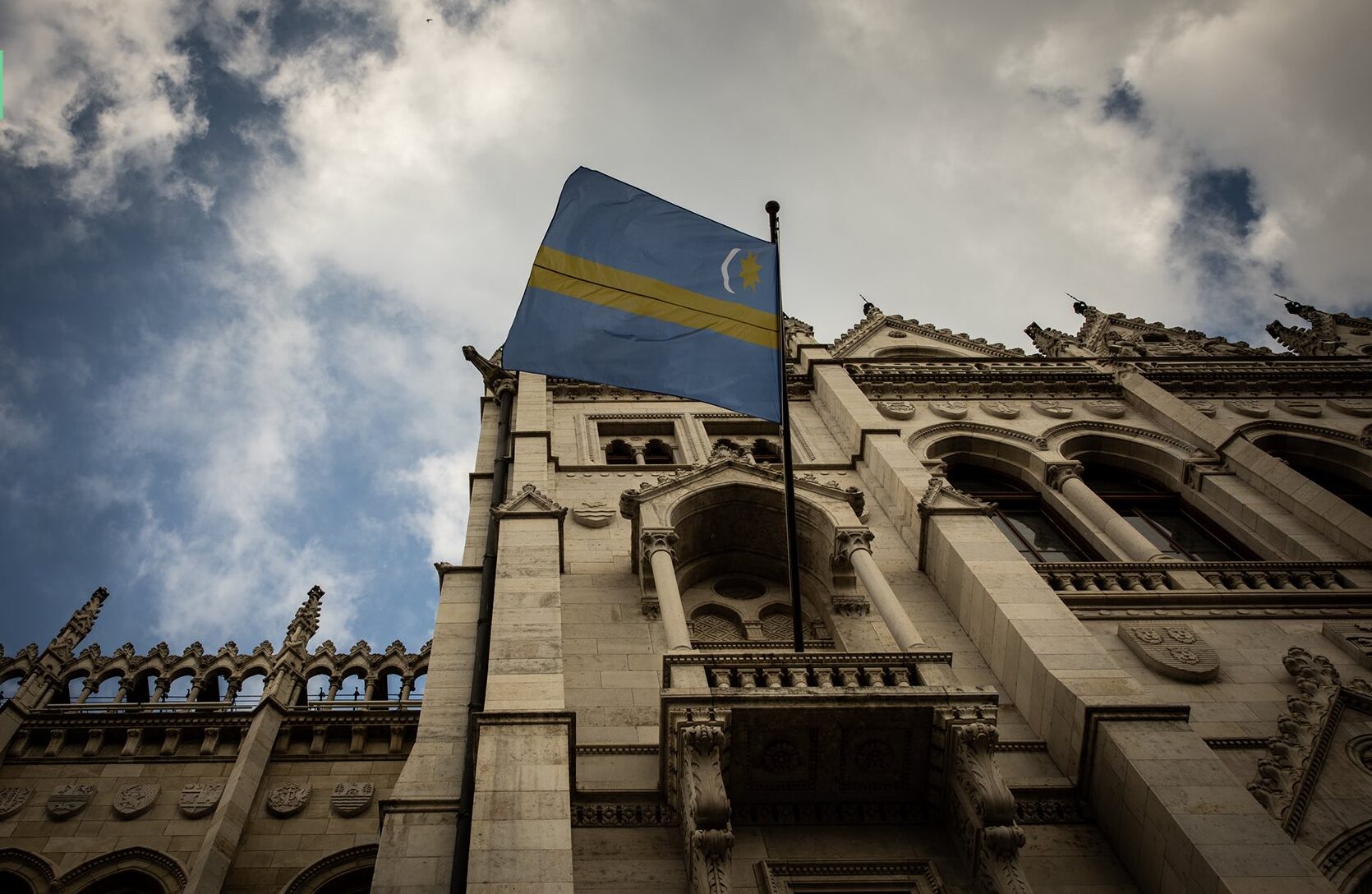
Never before have elections in Romania attracted so much international attention as the one taking place this Sunday in its second (or perhaps third) round. For this strategically important country, if you want to believe the leading political commentators, it is about nothing less than belonging to the often glorified “West.” In the case of the largest ‘magyar’ population outside Hungary, it is about much more, namely bare survival, as the parties and churches of ethnic Hungarians unanimously claim.
As far as the elections are concerned, the reactions of Hungarians in Romania lie somewhere between tragedy and comedy, between the famous dilemma in the rock opera Stephen, the King of Bródy and Szörényi – “Mondd, te kit választanál!” (Tell me who would you choose!) – and the dilemma of the inebriated citizen from the comedy A Lost Letter by the most important Romanian playwright I. L. Caragiale – “Eu cu cine votez?” (Who should I choose?). Although the two questions could not be more different – a fundamental decision for Western, Catholic civilization versus the confusion of the voter, who in a drunken stupor, no longer knows who bribed him – there is a common denominator, namely that it is not an ideology but a person who is at the center of the debate.
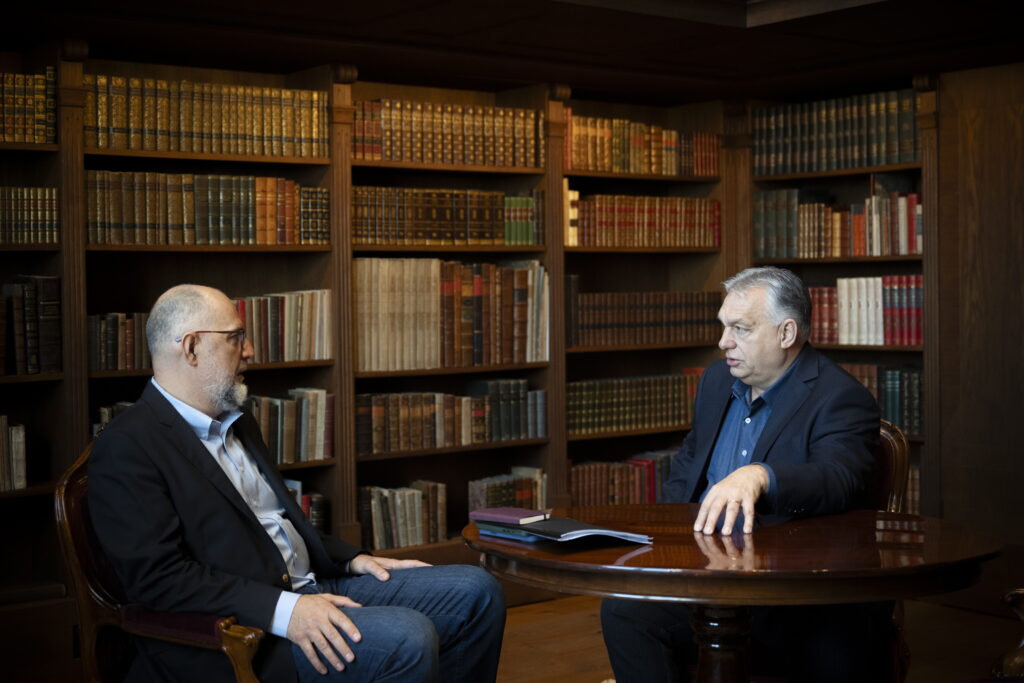
Viktor Orbán with RMDSZ President Hunor Kelemen. Photo: MTI/Miniszterelnöki Sajtóiroda/Benko Vivien Cher
No matter how much one insists on the need for a fundamental ideological clarification, such as “Brussels or Moscow, democracy or dictatorship,” an inadmissible simplification, what counts in the end is the honesty of the candidates. The era of political doctrines that mobilize the electorate on the basis of competing visions of society is over. Postmodernism has not yet been replaced by post-postmodernism. The deconstruction of political ideologies means that election campaigns are becoming oriental bazaars where traders sell their wares not so much by emphasizing quality, but rather by their charm, their credibility, their competence, in short: their own person.
Ultimately, we elect people, not ideologies, which are becoming increasingly volatile in this part of Europe too.
The progressive attitude of the inglorious resignation of USR leader Elena Lasconi, the former party colleague of current presidential candidate Nicușor Dan, went well with a pectoral cross worthy of an Orthodox bishop, as well as with the frequent references to the Most High (“God help us, bless us, protect us”) and the waving of the Bible above her head, as in a charismatic church service. For his part, Dan, reviled by his opponents as a lackey of the decadent West, resigned from the presidency of the left-liberal USR because he did not agree with the equality of “gay marriage.” George Simion’s operetta-like sovereigntism and his obtrusive display of piety only deceive those who want to be deceived.
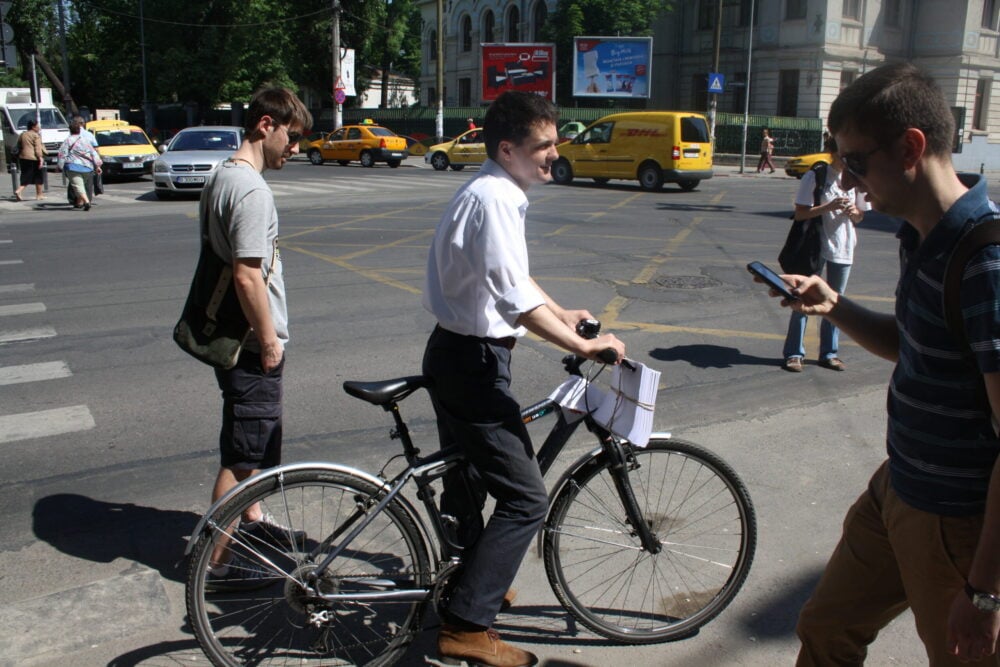
Nicușor Dan on a bicycle during the election campaign for mayor in Bucharest. Photo: Wikipedia
The credibility, the moral integrity of the candidate, should ultimately be the decisive factor for the Transylvanian Hungarians when they put their stamp on the ballot paper, as can be seen from countless statements by prominent and less prominent members of the ethnic group. Regardless of which camp one or the other political competitor belongs to, the decision in favor of a person who has never proven himself professionally and has only earned his living in politics, such as the nationalist presidential candidate Simion, is, as countless examples from our present day suggest, the worst possible option.
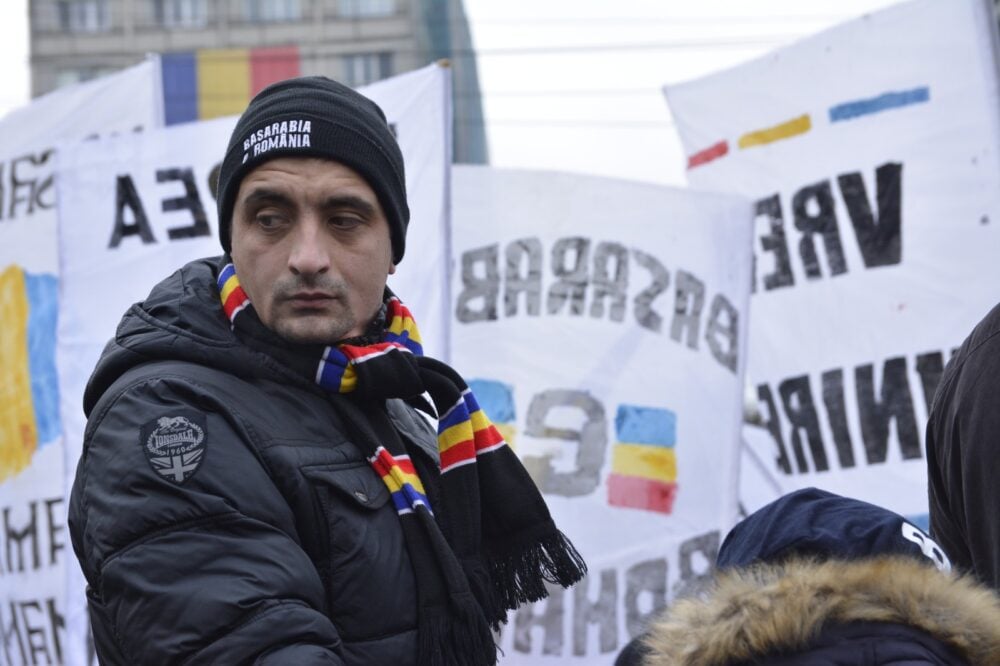
George Simion at the beginning of his political career. Photo: Wikipedia
The current tendency to promote political actors who are far too young, inexperienced, and culturally illiterate and therefore easily manipulated can be observed on both the left and the right of the political spectrum. Simion is one of them: a power-hungry upstart with no professional background who has made a name for himself solely through political activism. In comparison, Dan is a person with an education beyond reproach and a proven track record in the administration of a capital city. The differences in behavior and character are obvious to any neutral observer:
A troublemaker who favors gutter language on the one hand, and an intellectual balanced in words and deeds on the other.
Viktor Orbán’s speech in the Benedictine Abbey of Tihany has stirred up a lot of ideological dust, and not only in Romania. The “spiritus rector” of the European conservatives did not express his support for the would-be conservative Simion, despite all claims to the contrary, but rather, tactically quite cleverly, merely emphasized some ideas that the nationalist AUR party leader also likes to refer to and which could be demanded at some point.

Simion with Karol Nawrocki and Mateusz Morawiecki on March 20, 2025 in Brussels. Photo: Wikipedia
Fidesz refused to join Giorgia Meloni’s ECR parliamentary group precisely because of the inclusion of the AUR. Orbán probably assumes that Simion will win the election or at least become inevitable in the Bucharest power algorithm and is trying to find common ground for a future dialog nolens-volens. The common geography and history cannot be “corrected” like the first round of elections. If the majority of Romanians want such a head of state, this decision must be respected, however painful the consequences may be.
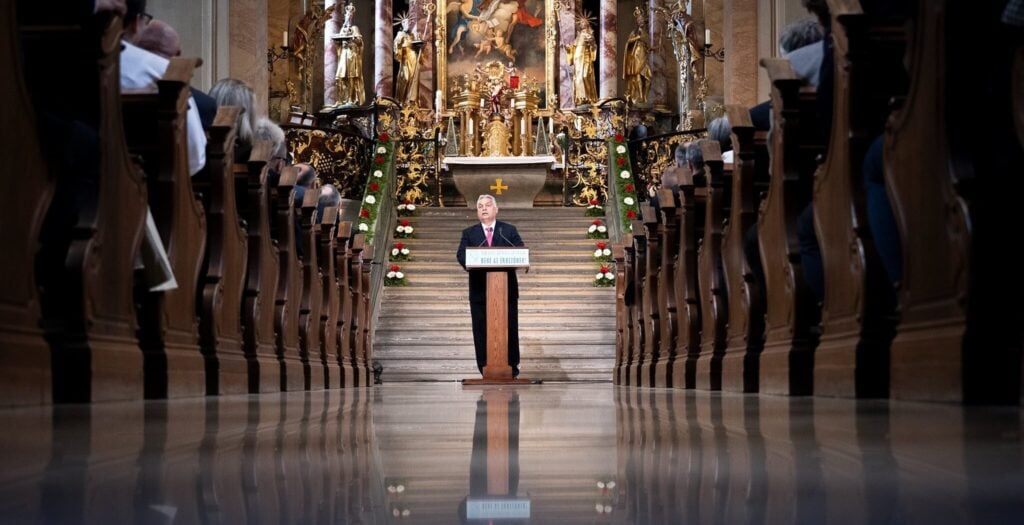
Viktor Orbán in Tihany. Photo: Facebook/Orbán Viktor
Today, resentment towards knowledge prevails among the Romanian electorate. The “deep Romania” corresponds to Simion’s image: not averse to violence, plagued by feelings of inferiority and therefore tending to be chauvinistic, opportunistic, vociferous, hypocritical, and self-righteous. Dan has a difficult time in this eminently toxic environment.
Simion’s predictable victory is causing panic in Western law firms and the temptation to “correct” the election result is very strong.
It is possible, as parliamentary speaker László Kövér indicated to Mandiner, that by mentioning Simion in his Tihany speech, the Hungarian Prime Minister wanted to send a signal to Brussels that he is not willing to participate in Romania’s political isolation, as happened with Austria in the past when Wolfgang Schüssel co-opted the FPÖ into the government and Vienna was quarantined as a result.
Meanwhile, Romania’s Hungarians are trying to strike a balance between Budapest and Bucharest. From Bucharest, the impression prevails that the voices of the Hungarians are welcome, but that their wishes are less so or not at all.
Ethnic Hungarians are increasingly dissatisfied with their role as a “maneuvering mass” in critical situations.
Yesterday they were implored to vote for Crin Antonescu to avert an impending “end of the world,” today they are being asked to do the same for Dan to avoid an impending “catastrophe.” This weariness is causing many ethnic Hungarians to turn a deaf ear to the appeals of their secular and ecclesiastical leaders, or even to rebel. Even if the hourly election recommendations are justified, from a broader perspective they give the impression of political manipulation, especially as the Romanian candidates have never yet fulfilled their promises to the Hungarian minority.
Featured image: Facebook/Orbán Viktor